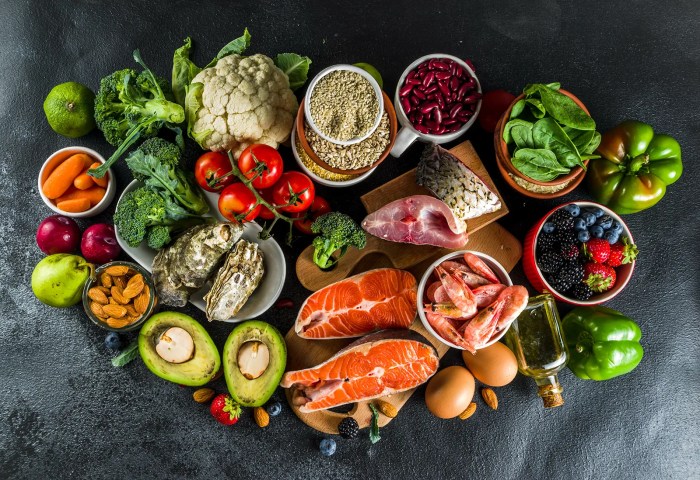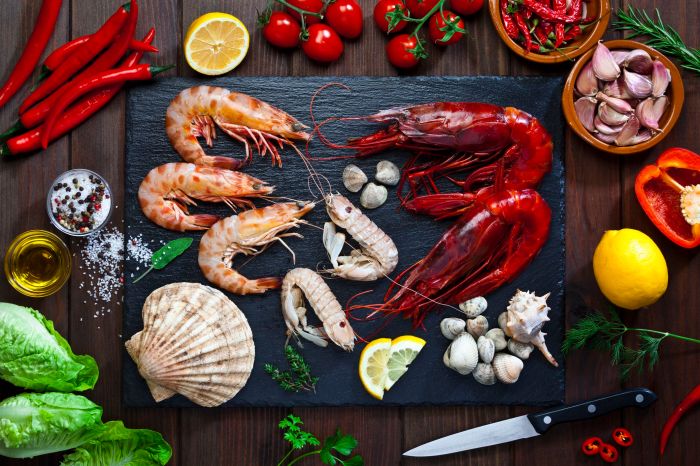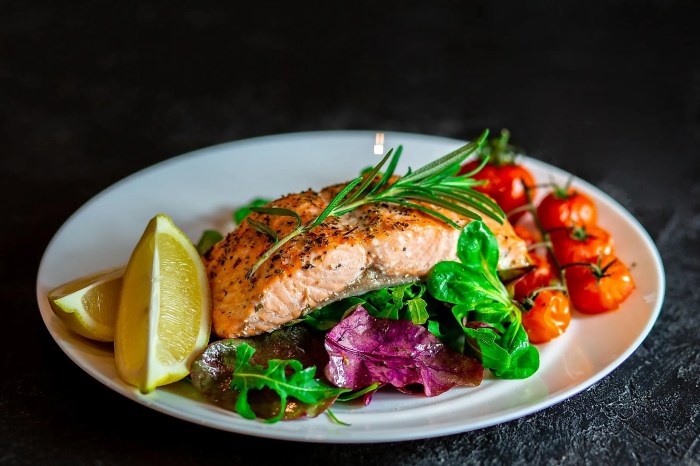Pescatarian veganism, a unique fusion of pescatarian and vegan diets, offers a balanced approach to nutrition and environmental sustainability. Embracing the best of both worlds, this diet emphasizes plant-based foods while incorporating fish and seafood.
This comprehensive guide explores the health benefits, environmental impact, and practical aspects of a pescatarian vegan lifestyle, providing evidence-based information and practical strategies for adopting this transformative diet.
Pescatarian Veganism

Pescatarian veganism is a diet that combines elements of both pescatarianism and veganism. Pescatarians are individuals who consume fish and other seafood but abstain from eating meat from land animals. Vegans, on the other hand, follow a plant-based diet that excludes all animal products, including meat, dairy, eggs, and honey.
Pescatarian vegans adopt a diet that includes fish and other seafood, but excludes all other animal products. This means that they consume plant-based foods such as fruits, vegetables, grains, legumes, and nuts, along with fish and other seafood.
Differences between pescatarian, vegan, and pescatarian vegan diets
The main difference between pescatarian, vegan, and pescatarian vegan diets lies in the inclusion or exclusion of animal products.
- Pescatariansconsume fish and other seafood, but avoid meat from land animals.
- Vegansexclude all animal products from their diet, including meat, dairy, eggs, and honey.
- Pescatarian vegansconsume fish and other seafood, but avoid all other animal products.
Health Benefits of a Pescatarian Vegan Diet

A pescatarian vegan diet combines the health benefits of a vegan diet with the inclusion of fish and seafood. This dietary approach offers a wide range of nutrients and antioxidants, contributing to overall well-being and reducing the risk of chronic diseases.
Reduced Risk of Heart Disease
- Pescatarian vegans consume high levels of omega-3 fatty acids from fish, which have been shown to lower blood pressure, reduce inflammation, and improve blood lipid profiles.
- Plant-based foods, such as fruits, vegetables, and whole grains, provide fiber, antioxidants, and phytochemicals that protect against heart disease.
Lowered Risk of Stroke
- The anti-inflammatory properties of omega-3 fatty acids and antioxidants in a pescatarian vegan diet help reduce oxidative stress and improve blood flow, lowering the risk of stroke.
- Plant-based foods contain potassium, which helps regulate blood pressure and reduce the risk of stroke.
Improved Management of Type 2 Diabetes, Pescatarian vegan
- Pescatarian vegans consume high levels of fiber, which helps slow down the absorption of glucose into the bloodstream, regulating blood sugar levels.
- Omega-3 fatty acids have anti-inflammatory properties that can improve insulin sensitivity, reducing the risk of developing type 2 diabetes.
Environmental Impact of a Pescatarian Vegan Diet

A pescatarian vegan diet, which excludes meat and dairy products but includes seafood, offers significant environmental benefits compared to other diets.
By eliminating meat consumption, pescatarian vegans reduce their contribution to greenhouse gas emissions, deforestation, and water pollution associated with animal agriculture.
Sustainable Seafood Practices
The inclusion of seafood in a pescatarian vegan diet can contribute to sustainable seafood practices by supporting fisheries that prioritize conservation and responsible fishing methods.
- Pescatarians tend to choose sustainable seafood options, such as species with healthy populations and those caught using methods that minimize bycatch.
- By creating demand for sustainably sourced seafood, pescatarian vegans encourage the growth of responsible fishing practices.
Reduced Greenhouse Gas Emissions
Animal agriculture is a major contributor to greenhouse gas emissions, particularly methane and nitrous oxide. By excluding meat and dairy, pescatarian vegans significantly reduce their carbon footprint.
- Livestock production accounts for approximately 14.5% of global greenhouse gas emissions.
- Seafood production, while less impactful than animal agriculture, still contributes to emissions. However, choosing sustainable seafood options and reducing overall seafood consumption can mitigate these impacts.
Challenges of a Pescatarian Vegan Diet
Adopting a pescatarian vegan diet may present certain challenges. Understanding these potential difficulties and developing strategies to overcome them can help individuals make an informed decision about adopting this dietary approach.
One potential challenge is ensuring adequate nutrient intake. Pescatarian vegan diets exclude all animal products, including meat, poultry, eggs, and dairy. This means that individuals must obtain essential nutrients from plant-based sources, which may require careful planning and supplementation.
Nutrient Deficiencies
- Vitamin B12:Vitamin B12 is primarily found in animal products, so pescatarian vegans must obtain it from fortified foods or supplements.
- Iron:Iron absorption from plant-based sources is lower than from animal sources. Consuming iron-rich foods, such as leafy greens, beans, and lentils, and combining them with vitamin C-rich foods can improve absorption.
- Omega-3 Fatty Acids:Omega-3 fatty acids are essential for brain and heart health. While fish is a good source, pescatarian vegans can obtain omega-3s from algae supplements or fortified foods.
- Calcium:Calcium is important for bone health. Fortified plant-based milks, leafy greens, and fortified tofu can provide adequate calcium intake.
Another challenge is the potential for social stigma. Some individuals may face criticism or misunderstanding from friends, family, or even healthcare professionals who are unfamiliar with pescatarian veganism. It is important to educate others about this dietary approach and to seek support from like-minded individuals or communities.
Overcoming Challenges
- Meal Planning:Careful meal planning is essential to ensure adequate nutrient intake. Include a variety of nutrient-rich plant-based foods from all food groups.
- Supplementation:Consider supplementing with vitamin B12, iron, and omega-3 fatty acids as needed to meet nutritional requirements.
- Social Support:Connect with other pescatarian vegans, join online communities, or consult with a registered dietitian for support and guidance.
- Education:Educate yourself about pescatarian veganism and its potential benefits. Share your knowledge with others to increase understanding and reduce stigma.
By addressing these challenges and developing effective strategies, individuals can successfully adopt a pescatarian vegan diet and enjoy its potential health and environmental benefits.
Recipes and Meal Plans for a Pescatarian Vegan Diet
A pescatarian vegan diet offers a wide array of culinary possibilities, combining the health benefits of a plant-based diet with the inclusion of fish and seafood. This section presents a sample meal plan and a collection of recipes that showcase the versatility and flavor of this dietary approach.
Sample Meal Plan
A well-balanced pescatarian vegan meal plan should provide all essential nutrients, including protein, iron, vitamin B12, and omega-3 fatty acids. Here is a sample plan that meets these requirements: Breakfast:
If you’re considering going pescatarian , you’re not alone. More and more people are choosing to adopt a pescatarian lifestyle, which involves abstaining from eating meat and poultry while still consuming fish and seafood. There are many reasons for choosing this diet, including health, environmental, and ethical concerns.
- Oatmeal with berries, nuts, and plant-based milk
- Tofu scramble with vegetables
Lunch:
- Salad with grilled salmon, quinoa, and roasted vegetables
- Lentil soup with whole-wheat bread
Dinner:
- Baked cod with roasted potatoes and asparagus
- Vegan sushi with brown rice, vegetables, and avocado
Snacks:
- Fruits and vegetables
- Nuts and seeds
- Plant-based yogurt
Recipes
The following recipes offer a taste of the culinary delights that a pescatarian vegan diet has to offer: Quinoa Salad with Grilled Salmon and Roasted VegetablesIngredients:
- 1 cup quinoa, cooked
- 1 grilled salmon fillet, flaked
- 1 cup roasted vegetables (such as broccoli, carrots, and bell peppers)
- 1/2 cup chopped red onion
- 1/4 cup chopped fresh parsley
- 1/4 cup olive oil
- 2 tablespoons lemon juice
- Salt and pepper to taste
Instructions:
- Combine all ingredients in a large bowl.
- Toss to coat.
- Serve immediately or chill for later.
Vegan Sushi with Brown Rice, Vegetables, and AvocadoIngredients:
- 1 cup brown rice, cooked
- 1/2 cup sliced cucumber
- 1/2 cup sliced avocado
- 1/4 cup sliced carrots
- 1/4 cup sliced bell peppers
- 1 sheet nori seaweed
- 1/4 cup sushi vinegar
- Soy sauce for dipping (optional)
Instructions:
- Spread the rice evenly over the nori seaweed.
- Arrange the vegetables and avocado on top of the rice.
- Roll up the seaweed tightly.
- Slice into bite-sized pieces.
- Serve with soy sauce for dipping, if desired.
These recipes and the sample meal plan demonstrate the variety and flavor that a pescatarian vegan diet can offer. By incorporating these dishes into your meals, you can enjoy the health benefits of a plant-based diet while still enjoying the taste of fish and seafood.
Adopting a plant-based diet can be daunting, but transitioning to a pescatarian lifestyle is a great way to start. By incorporating seafood into your diet while reducing meat consumption, you can reap the benefits of a plant-based lifestyle without completely giving up animal products.
Going pescatarian offers numerous health advantages, including reduced risk of heart disease, stroke, and certain types of cancer. It’s also an environmentally friendly choice, as seafood has a lower carbon footprint compared to meat production.
Summary
In conclusion, a pescatarian vegan diet emerges as a viable and rewarding dietary choice, offering a wealth of health benefits, environmental sustainability, and culinary versatility. Whether seeking improved well-being, reduced environmental footprint, or simply a flavorful and ethical way of eating, this diet provides a balanced and fulfilling approach.
FAQ Compilation: Pescatarian Vegan
What are the key differences between pescatarian, vegan, and pescatarian vegan diets?
Pescatarians consume fish and seafood but no other animal products, vegans abstain from all animal products, while pescatarian vegans include fish and seafood in their otherwise vegan diet.
Does a pescatarian vegan diet provide sufficient protein?
Yes, fish, seafood, beans, lentils, and tofu are excellent sources of protein in a pescatarian vegan diet.
How can I ensure I get enough vitamin B12 on a pescatarian vegan diet?
Vitamin B12 is primarily found in animal products, so pescatarian vegans should consume fortified foods or supplements to meet their needs.